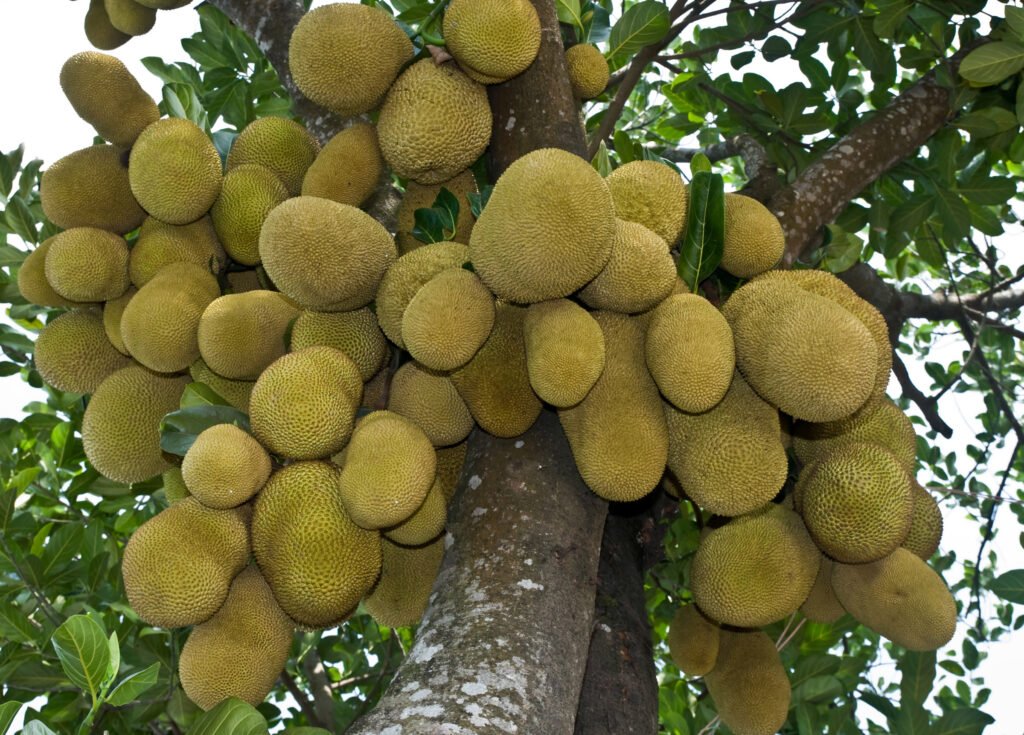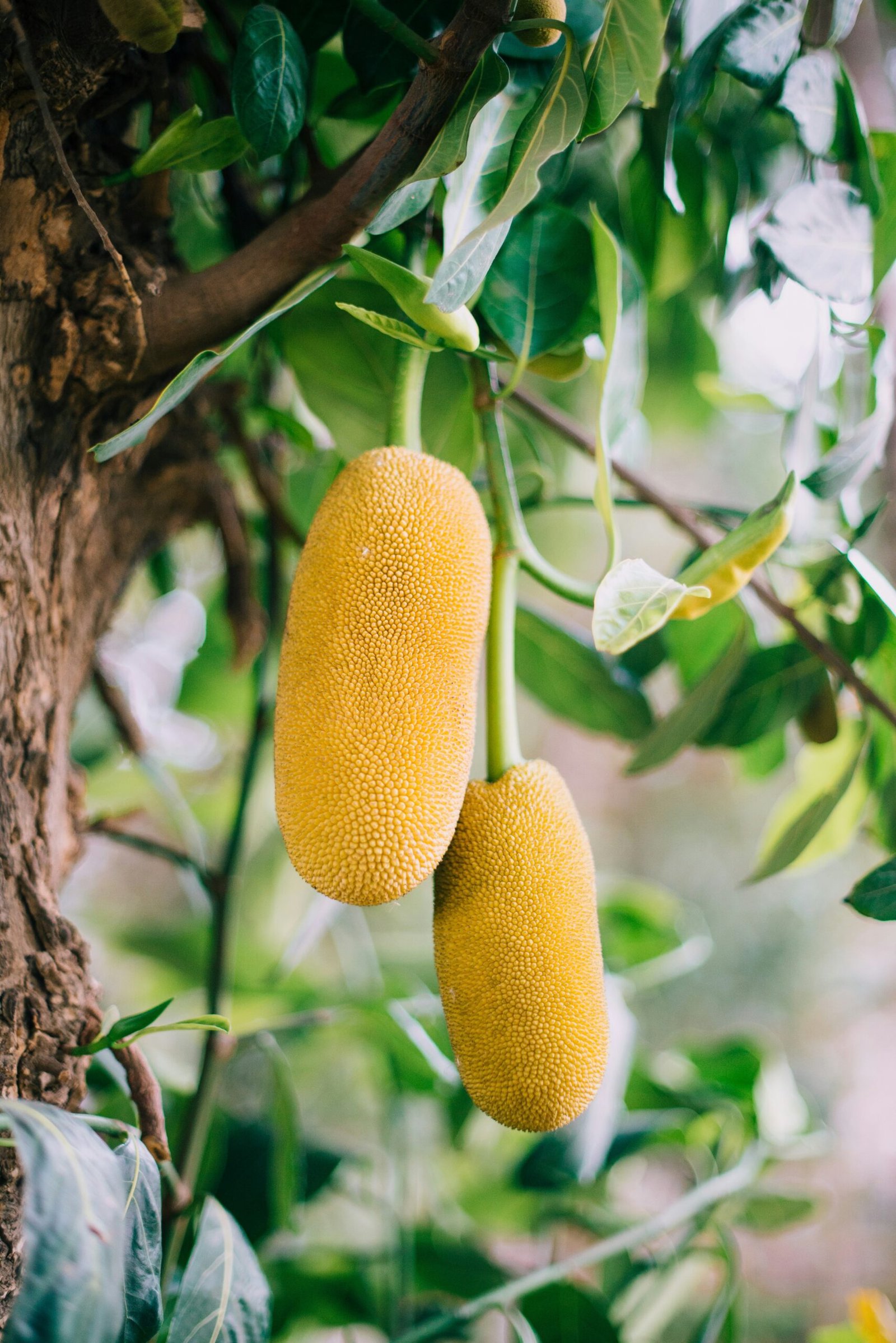Introduction to Jackfruit

Jackfruit, known scientifically as Artocarpus heterophyllus, is a remarkable fruit native to the tropical regions of South and Southeast Asia. Renowned for its impressive size, the jackfruit holds the title of the largest tree-borne fruit globally, with some specimens weighing up to 80 pounds. This colossal fruit is easily identifiable by its distinctive appearance, characterized by a spiky outer skin that varies in color from green to yellow as it ripens.
Originating in countries such as India, Bangladesh, Sri Lanka, and the rainforests of Malaysia, jackfruit has been cultivated for centuries. It thrives in the warm, humid climates of these regions, where it grows abundantly on large, evergreen trees that can reach heights of up to 80 feet. The fruit itself is a composite of multiple small, fleshy flowers, each developing into a bulbous, edible pod enclosed within the rough exterior.
Jackfruit’s unique structure and substantial size make it a standout in both appearance and culinary potential. Its interior is composed of numerous yellowish, fibrous pods that are sweet and fragrant when ripe, exuding a flavor often compared to a combination of banana, mango, and pineapple. When unripe, the fruit has a more neutral taste and a meat-like texture, making it a popular meat substitute in vegetarian and vegan dishes.
Despite its somewhat intimidating size and spiny exterior, jackfruit is highly valued for its versatility and nutritional benefits. As we delve further into the different aspects of this extraordinary fruit, its nutritional profile, potential health benefits, and various culinary uses will be explored in greater detail.
Nutritional Profile of Jackfruit
Jackfruit stands out as a nutrient-dense fruit, offering a plethora of vitamins, minerals, and other beneficial compounds. One of the most prominent nutrients found in jackfruit is Vitamin C. A single serving provides a significant portion of the daily recommended intake, supporting immune function and skin health. Additionally, jackfruit is a good source of Vitamin B6, which plays a crucial role in brain health and the production of neurotransmitters.
Minerals are another vital component of jackfruit’s nutritional profile. This fruit is rich in potassium, an essential mineral for regulating blood pressure and promoting cardiovascular health. Magnesium in jackfruit aids in muscle function and energy production, while manganese contributes to bone health and metabolism.
Dietary fiber is abundant in jackfruit, making it an excellent choice for digestive health. Fiber aids in maintaining regular bowel movements and can help in managing weight by promoting a feeling of fullness. Despite being nutrient-rich, jackfruit has a low-fat content, making it a heart-friendly option for those aiming to reduce their fat intake.
Antioxidants are another key feature of jackfruit’s nutritional makeup. Carotenoids, which give jackfruit its yellowish color, are potent antioxidants that can help protect cells from damage. Flavonoids, also present in jackfruit, have anti-inflammatory and antioxidant properties that contribute to overall health and wellness.
Incorporating jackfruit into your diet can provide numerous health benefits due to its comprehensive nutritional profile. Whether consumed fresh or as part of a recipe, this versatile fruit offers a valuable addition to a balanced diet.
Culinary Uses of Jackfruit
Jackfruit, a versatile fruit native to South Asia, offers a myriad of culinary applications across different cultures. When ripe, jackfruit’s sweet and aromatic flesh can be enjoyed raw, providing a delightful snack or ingredient for desserts. Its unique combination of flavors, often compared to a mix of banana, mango, and pineapple, makes it a popular choice for fruit salads, smoothies, and even ice creams.
In contrast, the unripe or young jackfruit presents a completely different culinary profile. Known for its fibrous, meat-like texture, unripe jackfruit has become a favorite meat substitute in vegetarian and vegan cuisines. This texture, paired with its remarkable ability to absorb flavors from marinades and seasonings, makes it an excellent alternative to traditional meat in various dishes.
One of the most well-known dishes featuring unripe jackfruit is jackfruit curry. In this dish, the fruit is cooked with a rich blend of spices, coconut milk, and vegetables, resulting in a hearty and flavorful meal. Similarly, jackfruit tacos have gained popularity, especially in Western countries, where the fruit is seasoned and braised to mimic the texture and taste of pulled pork. These tacos are often garnished with fresh vegetables, salsa, and avocado, making them a delicious and nutritious option for those following plant-based diets.
Beyond savory applications, jackfruit also finds its place in sweet preparations. Ripe jackfruit is used in various desserts, such as puddings, cakes, and traditional sweets in South Asian cuisines. Its natural sweetness and vibrant color add an exotic touch to these treats, making them a favorite during festive occasions.
Overall, the culinary uses of jackfruit are diverse and multifaceted. Whether enjoyed raw, cooked in savory dishes, or incorporated into desserts, jackfruit continues to be celebrated for its versatility and unique flavor profile across the globe.
Health Benefits of Jackfruit
Jackfruit, a tropical fruit native to South Asia, is increasingly recognized for its extensive health benefits. Rich in essential nutrients, jackfruit can significantly contribute to various aspects of health and well-being.
Firstly, jackfruit is an excellent source of vitamin C, which plays a vital role in boosting the immune system. Vitamin C is known for its antioxidant properties, helping to protect the body against free radical damage and enhancing the immune response. A study published in the *Journal of Nutritional Biochemistry* highlighted that the high vitamin C content in jackfruit can stimulate the production of white blood cells, thereby strengthening the immune system.
Secondly, jackfruit is beneficial for digestion due to its high fiber content. Dietary fiber is essential for maintaining a healthy digestive system as it aids in regular bowel movements and prevents constipation. According to a study in the *Journal of Clinical Gastroenterology*, regular consumption of fiber-rich foods like jackfruit can improve gut health and reduce the risk of developing gastrointestinal disorders.
Moreover, jackfruit supports cardiovascular health. It contains potassium, which is crucial for regulating blood pressure and maintaining heart function. Research published in the *American Journal of Clinical Nutrition* indicates that a diet rich in potassium can help lower the risk of hypertension and stroke. Additionally, the antioxidants in jackfruit, such as flavonoids and lignans, have been shown to reduce oxidative stress and inflammation, which are key factors in cardiovascular disease.
Lastly, jackfruit promotes healthy skin. The fruit is packed with vitamin A and other antioxidants that support skin health by protecting against damage from UV rays and environmental pollutants. A study in the *Journal of Dermatological Treatment* found that vitamin A can help in the repair of skin tissues and improve overall skin texture.
In summary, the consumption of jackfruit offers a multitude of health benefits, from enhancing the immune system and aiding digestion to supporting cardiovascular health and maintaining healthy skin. These benefits are backed by scientific studies, making jackfruit a valuable addition to a balanced diet.
Jackfruit as a Meat Substitute
The increasing popularity of jackfruit as a meat substitute is a testament to the growing interest in plant-based diets and sustainable living. Jackfruit, particularly when unripe, boasts a fibrous and meat-like texture that makes it an excellent alternative to traditional meat options such as pulled pork or chicken. This versatility has garnered jackfruit a place in numerous vegetarian and vegan recipes, catering to a wide array of culinary preferences.
One of the primary reasons for jackfruit’s acclaim as a meat substitute is its remarkable ability to absorb flavors. When cooked and seasoned properly, jackfruit can mimic the taste and texture of various meats, making it a favorite in dishes like vegan pulled pork sandwiches, jackfruit tacos, and jackfruit curry. Its neutral taste allows it to blend seamlessly with a variety of spices and sauces, creating a satisfying and flavorful meal.
Beyond its culinary versatility, jackfruit aligns with the trend of sustainable and ethical eating. As a plant-based food source, jackfruit requires fewer resources to produce compared to meat, contributing to lower greenhouse gas emissions and reduced environmental impact. Additionally, jackfruit trees are known for their resilience and ability to thrive in diverse climates, making them a sustainable crop choice.
Popular recipes showcasing jackfruit as a meat substitute include BBQ jackfruit sliders, where the fruit is slow-cooked with barbecue sauce to replicate the tender texture of pulled pork. Another favorite is jackfruit “chicken” salad, where shredded jackfruit is combined with vegan mayo, celery, and herbs to create a delicious and cruelty-free alternative to traditional chicken salad. These recipes not only highlight the adaptability of jackfruit but also underscore its role in promoting a more ethical and environmentally conscious diet.
Incorporating jackfruit into plant-based diets is more than just a culinary trend; it represents a shift towards more sustainable and ethical food choices. As more people become aware of the benefits of jackfruit, its popularity as a meat substitute is likely to continue growing, offering delicious and eco-friendly alternatives to conventional meat dishes.
Environmental Impact of Jackfruit Cultivation
Jackfruit cultivation offers several environmental advantages, making it a sustainable choice compared to other agricultural crops. One of the primary benefits is its resilience to climate change. Jackfruit trees are highly adaptable, thriving in both humid and dry tropical climates. They can withstand fluctuations in temperature and precipitation, making them a reliable crop in the face of global climate uncertainties.
Another significant environmental benefit of jackfruit cultivation is its minimal need for pesticides. Jackfruit trees naturally exhibit resistance to many common pests, reducing the reliance on chemical pesticides that can be harmful to the ecosystem. This characteristic not only promotes healthier soil and water quality but also supports biodiversity by preserving the habitats of beneficial insects and other wildlife.
Jackfruit’s potential to reduce food waste is another noteworthy advantage. The fruit’s large size and versatility make it an excellent candidate for multiple uses. Both the ripe and unripe fruit can be consumed, while the seeds and rind can also be utilized in various culinary applications. This reduces the likelihood of produce being discarded, contributing to more efficient food systems and less waste overall.
Sustainable farming practices are often associated with jackfruit cultivation. These include agroforestry practices where jackfruit trees are integrated into mixed-crop systems, enhancing soil fertility and reducing erosion. Additionally, jackfruit trees have a low water requirement compared to other fruit trees, making them suitable for regions prone to water scarcity. This water efficiency further underscores the environmental sustainability of jackfruit farming.
In summary, the cultivation of jackfruit presents a range of environmental benefits. Its climate resilience, minimal pesticide requirements, potential to reduce food waste, and compatibility with sustainable farming practices collectively highlight the ecological value of this versatile fruit. As global agricultural systems seek more sustainable solutions, jackfruit stands out as a crop that can contribute positively to environmental stewardship.
Jackfruit is widely appreciated for its nutritional benefits and versatility in culinary applications. However, like any food, it is essential to be aware of potential allergens and side effects associated with its consumption. Although jackfruit is generally safe for most individuals, certain people might experience adverse reactions.
Potential Allergens
Jackfruit contains specific proteins that can trigger allergic reactions in some individuals. Those who are allergic to birch pollen or latex may be more susceptible due to cross-reactivity. Symptoms of a jackfruit allergy can range from mild to severe and may include itching, swelling, hives, or difficulty breathing. In rare cases, anaphylaxis, a severe allergic reaction, can occur.
Digestive Issues
In addition to allergic reactions, some people might experience digestive issues when consuming jackfruit. This can manifest as bloating, gas, or diarrhea, particularly for those with sensitive digestive systems. The high fiber content in jackfruit, while beneficial for many, can cause discomfort if introduced too quickly or in large quantities.
Introduction and Precautions
To minimize the risk of adverse reactions, it is advisable to introduce jackfruit into your diet gradually. Start with small portions to monitor your body’s response. If you have a history of food allergies or digestive issues, consulting with a healthcare provider before adding jackfruit to your diet is prudent. They can offer personalized advice and ensure that it is a safe choice for you.
In conclusion, while jackfruit offers numerous health benefits, it is crucial to be mindful of potential allergens and digestive side effects. By taking a cautious and informed approach, you can enjoy the unique taste and nutritional advantages of jackfruit safely.
How to Select and Store Jackfruit
When selecting a ripe jackfruit, there are several key indicators to consider. Firstly, the fragrance is a significant factor; a ripe jackfruit emits a strong, sweet aroma that can be easily detected. Another crucial aspect is the color. A fully ripened jackfruit typically exhibits a yellowish-brown hue, indicating that it’s ready for consumption. Additionally, the firmness of the fruit should be assessed. A ripe jackfruit will feel slightly soft to the touch, but not overly mushy, suggesting that it is neither underripe nor overripe.
Once you have selected a ripe jackfruit, proper storage is essential to maintain its freshness and extend its shelf life. If you plan to consume the jackfruit within a few days, storing it at room temperature is adequate. However, for longer storage, it is recommended to place the whole jackfruit in the refrigerator. This will help preserve its freshness for up to a week. For cut jackfruit, it is best to store the pieces in an airtight container in the refrigerator, where they can last for up to five days.
For those who wish to extend the shelf life of jackfruit even further, freezing is an excellent option. To freeze jackfruit, first, remove the seeds and cut the flesh into manageable pieces. Lay the pieces on a baking sheet lined with parchment paper and place them in the freezer until they are solid. Once frozen, transfer the jackfruit pieces into a freezer-safe bag or container. Properly stored frozen jackfruit can last for several months, making it a convenient option for those looking to enjoy this nutrient-rich fruit year-round.
By following these guidelines for selecting and storing jackfruit, you can ensure that you are always able to enjoy its unique flavor and numerous health benefits. From choosing the perfect fruit to employing effective storage methods, these tips will help you make the most of this versatile and delicious fruit.

